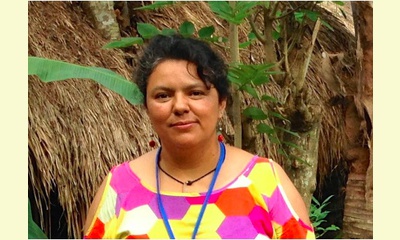|
|
Bali summit: Are women our best hope for fighting climate change?
un article par Eve Andrews, Grist (abridged by permission)
[Global Greengrants, the International Network of Women’s
Funds, and the Greengrants Alliance of Funds hosted a
Summit on Women & Climate, August 3-7, 2014, in Bali,
Indonesia, to bring together women’s and environmental
rights leaders from around the world. Eve Andrews
interviewed some of the participants.] 
For her efforts to block a hydroelectric plant on a river sacred to her community, Bertha Cáceres has been relentlessly persecuted and threatened by the Honduran government. Photo by Eve Andrews
click on photo to enlarge
“For indigenous women, the relationship with the
environment is very important – it has such a high impact on
[their] lives,” says Mariana Lopez, program coordinator for
the International Indigenous Women’s Forum. “They have a
very close relationship with the cycles of nature. But with
climate change altering those patterns — well, when nature
is unpredictable, it’s very disruptive to their lives” . . . .
Ursula Rakova, executive director of Tulele Peisa, . . . is in
the process of relocating her entire community from the
Papua New Guinean island of Tulun to the nearby island of
Bougainville. Why would someone go to all that trouble?
Because Tulun is slowly disappearing into the sea. . . .
Rakova, like many other of the summit delegates, occupies
an important role. As a woman in her community, she is
primarily responsible for every aspect of food provision:
farming, fishing, foraging, preparation. Because Tulun has
been slowly eaten away by an invading ocean, the arable
land is gone; the soil has been soaked in salt water. Nothing
will grow except rice, which is not part of the traditional
diet. The traditional staple of taro has died off from Tulun
completely.
“Women are now being forced to do more physical work
because they’ve got to find food,” she tells me. “And when
they find the little food that they can, they give it to their
children. They go without food almost every day. It is the
women on the island who are suffering more of the impact
[of climate change] than anyone else.”
Nearly 40 years ago, the Tulun community noticed that the
ocean began to eat away at the shores of the island.
“We knew that something was happening to the island,” she
says. “Although we did not really understand the science of
climate change, we could see before our eyes that the
islands were getting smaller, and the storms were more
frequent, the king tides were frequent” . . .
Bertha Cáceres is the general coordinator of COPINH, an
organization that has been fighting for control of indigenous
lands for the Lenca people of Honduras for more than 20
years. . .
When I asked Bertha Cáceres how she considers the role that
women — particularly indigenous women — will play in
fighting climate change, this was her response:
“We have to change the system, not the climate, right? I
think that we, as women, are in a very important moment
right now, politically and historically speaking. Now is the
era of women.”
[Thank you to Janet Hudgins, the CPNN reporter for this
article.]
|








|
DISCUSSION
Question(s) liée(s) à cet article:
Do women have a special role to play in sustainable development?,
* * * * *
Commentaire le plus récent:
This discussion question applies to the following articles:
Dublin: Women central to sustainable future development
Calling women: Why women and technology are a perfect pairing
Indigenous women from Canada and the Global South unite at the UN Permanent Forum on Indigenous Rights
Mothers Light Up Homes in Rural Tanzania
Bali summit: Are women our best hope for fighting climate change?
U.N. Climate Talks Advance Link Between Gender and Climate Change
Women Revolutionise Waste Management on Nicaraguan Island
On remote Philippine island, female forest rangers are a force to be reckoned with

|
|









